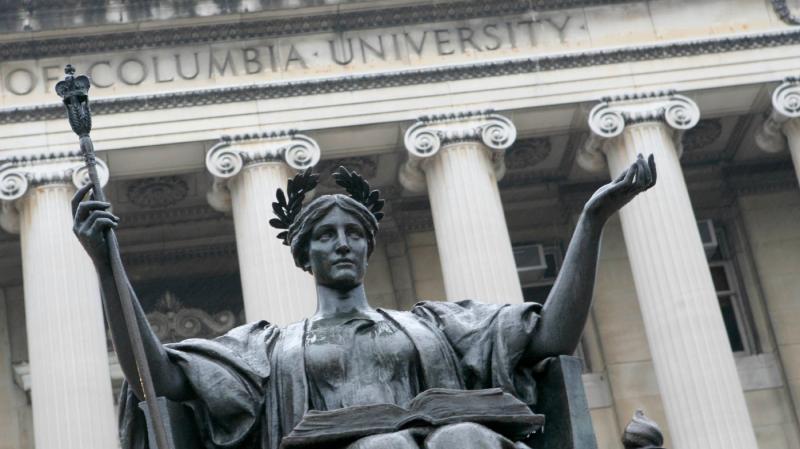Trump tactics against Columbia worry other universities



Universities could soon face two tough options: bow to the Trump administration or fight back.
The federal government has yet to restore $400 million in frozen funding to Columbia even after the Ivy League school agreed to change its disciplinary policies and put some departments under academic receivership, as the administration demanded. The concessions are only a "first step" to restore the funding, Trump officials have said, though they have yet to lay out any others.
Developments in the saga surrounding Columbia, which is accused by White House of failing to protect its students from antisemitism, will be closely watched by other colleges that could find themselves under President Trump's eye.
The University of Pennsylvania and the University of Maine have both already seen some of their federal funding paused over policies related to transgender athletes, and Trump's Education Department announced Monday it is initiating a review of Harvard University similar to that at Columbia, potentially threatening billions of dollars in federal grants.
"I hope [other universities] will look at it and see a kind of roadmap for their own institutions, and that they will pursue reforms on their own, whether that be led by the university presidents, the faculty senates, and ultimately, as well, members of the Boards of Trustees," said Steve McGuire, the Paul & Karen Levy Fellow in Campus Freedom at the American Council of Trustees and Alumni.
"I think it's critical that trustees are especially engaged at this moment and paying attention to what's going on and asking about where do their institutions stand relative to the kinds of concerns that the administration has expressed about Columbia," McGuire added.
But advocates are appalled at what Columbia is giving up without any guarantee of getting the money back, including banning masks, updating its official definition of antisemitism and appointing a new senior vice provost to oversee the departments of Middle East, South Asian and African studies.
A lawsuit has been filed against the Trump administration by the American Federation of Teachers and the American Association of University Professors over the funding pause and demands its made of Columbia. The suit alleges the federal government is using "coercive tactics" and is in violation of statutory requirements.
Others see the moves by the federal government as an abuse of the procedures outlined in investigating civil rights cases against colleges. Antisemitism is a serious problem, they say, but the Trump administration is not operating in good faith.
"This process has been arbitrary, inappropriate and completely overreaching," said Sara Partridge, associate director of higher education policy at the Center for American Progress.
Partridge outlined the steps typically taken against universities when civil rights violations are alleged, such as investigating, giving a notice and hearing to the recipients and submitting a report to Congress — before funding is taken away.
Funding is also supposed to be limited to programs that have been found in noncompliance with civil rights law, she added, but cancelations to Columbia contracts have hit apparently unrelated programs such as funding from the National Institutes of Health.
"The arbitrary cancelation of research contracts, particularly for potentially lifesaving health and medical research, before an investigation has even been completed, amounts to an inappropriate and overreaching use of the civil rights enforcement process," Partridge said.
Higher education institutions are far from the only ones getting obey-or-suffer ultimatums from the administration. Other groups that have engendered Trump's wrath, including the media and leading law firms, are also grappling with demands they find unpalatable, with the threat of Oval Office action looming over their heads.
Universities have been quietly watching the fracas unfold, with some making changes before the fight gets to them.
The University of Michigan announced last week it would be closing its diversity, equity and inclusion offices, a favored target of Trump's, and numerous other schools have announced changes to protesting policies after the pro-Palestinian encampments last year.
The White House is also pointing to those protests as it ramps up immigration arrests and detentions against foreign-born students and faculty, including against members of the Columbia and Harvard communities. Schools that refuse to go along with the enforcement actions, which have targeted legal permanent residents as well as those in the country on student visas, could find themselves next on the funding chopping block.
Amid the Trump administration's crusade around higher education and polls showing trust in universities are falling, some argue it is long past for colleges to change their ways.
"We have increasingly been moving towards a sort of crisis of public confidence in our institutions of higher education, and we were not seeing a lot of evidence from the colleges and universities that they were going to pursue significant reforms on their own," McGuire said.
While he thinks "there's certainly room for concern" about how Trump has gone after schools, "it also needs to be balanced against the fact that there really is a crisis of public confidence here that needs to be addressed," McGuire added.








We need to change them.
Let us dig into what Columbia is teaching.

I don't think Trump cut funding where his son attends one of the most liberal universities in America in New York. Trump may still go after the college funding if they get any government funding but it's clear why he didn't for now.